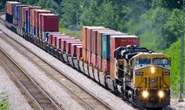Logistics

October 10, 2019
Railroads Face Price-Fixing Allegations
Written by Sandy Williams
Four U.S. railroad companies have been accused of price-fixing by more than two dozen companies including steel producers AK Steel and North Star Bluescope.
On Sept. 30, more than two dozen lawsuits were filed against BNSF, CSX, Norfolk Southern and Union Pacific claiming the rail carriers conspired to set rate-based fuel surcharges that increased rates for rail freight shipments over a period of at least five years.
“In 2003, the four largest United States-based Class I railroads engaged in an extraordinary series of meetings, phone calls and email communications through which they embarked on a conspiracy – under the guise of a fuel cost recovery program – to apply and enforce rail fuel surcharges across their customers in order to generate profits,” stated several of the court filings.
The filings continued, “Defendants used ‘rate-based’ fuel surcharges – i.e., surcharges that use a percentage applied to the base rate for a shipment – as a means to impose across-the-board rate increases on rail freight shipments, a result that would have been prohibitively difficult to achieve on a contract-by-contract basis. Throughout the conspiracy and despite customer pushback against Defendants’ fuel surcharges, Defendants set aside their individual, economic self-interest to undercut one another and instead staunchly maintained their fuel surcharge program, pocketing billions of dollars in profits as a result.”
On Oct. 2, North Star BlueScope Steel, AK Steel, Steelscape, LLC, et. al, joined other plaintiffs in filing an anti-trust suit with the U.S. District Court for the District of Columbia. Steel mills use the rail system for transport of raw materials and finished products.
The litigation against the four Class-1 railroads has been ongoing since 2007. In August 2019, an appellate court in the District of Columbia upheld a decision that prevented shippers from forming a class action suit, resulting in the recent multiple filings before a court deadline.
In previous litigation the railroads argued that surcharges are a common way for those in the transportation industry to recover the cost of fuel increases. The rail carriers deny there was any attempt to coordinate charges to increase profits.
AK Steel and North Star Bluescope were unavailable for comment.






